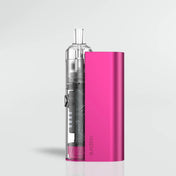In recent months we have seen dramatic changes in attitude and actions proposed towards furthering the UK government’s “smoke free future” plan, due to reach its desired conclusion of sub-5% of the populace smoking by 2030.
June 2021 saw the introduction of a new and ongoing NHS trial which would see five major hospitals provide vaping starter packs to A&E patients who identify as smokers. In doing so they hope to assess the effectiveness of e-cigarettes as a smoking cessation tool.
This is something that an increasing number of experts and healthcare professionals have begun to profess as fact, supported by multiple reports which demonstrate quit rates dramatically improved when the individual used vaping in conjunction with more traditional cessation techniques such as behavioural therapies
Further to this, Labour MP Mary Kelly Foy has recently driven a new proposal calling for amendments to current legislature governing tobacco, which would see “smoking kills” printed on individual cigarette sticks as well as packs and align the legal age for tobacco consumption with the likes of the US, raising from 18 to 21.
With these developments and more we are seeing an increasing amount of force being put behind the UK’s “smoke free future” targets, with the Medicines and Healthcare Products Regulatory Agency (MHRA) now sending out a call to action for all vaping manufacturers in the hopes of finding a device they deem fit to provide on prescription via the NHS, The Guardian reports.
A World First in Smoking Cessation
Should a vaping device be found, or developed, that meets the exacting standards of the MHRA, this would make the UK the first country in the world to prescribe a medically licensed e-cigarette to potential quitters.
The MHRA has updated its guidance in an attempt to slash smoking rates which prevail despite ever-increasing taxation, restrictive legislation and increasingly graphic and visceral warnings of the now well-understood damage cigarettes can cause to the body and beyond.
Circa 64,000 people still die annually from smoking related illness annually in the UK, and it is hoped that introducing e-cigarettes alongside existing prescribed medical products will help to improve public perception and encourage far more successful quit attempts.
Dr June Raine, the chief executive of the MHRA has said the evidence is “clear” that e-cigarettes are less harmful than smoking tobacco and that they can help people to quit for good. Going on to say that “The updated guidance on licensing requirements we have published today is a strong first step towards availability of safe and effective licensed e-cigarette products.”
Despite the desire to use e-cigarettes to reduce the number of smokers, it has been highlighted that they intend for vaping to be a more widely utilised gateway to a nicotine free lifestyle, rather than a simple substitution of one habit for another.
Lord Kamall, the Parliamentary Under-Secretary for Health and Social care has stated:
“The point about the e-cigarettes and the MHRA’s wish to licence products is that it wants to move smokers on to a pathway away from smoking cigarettes and on to e-cigarettes since they are seen as a safer option. It does not want to encourage people to smoke e-cigarettes, but to move them off cigarettes and on to e-cigarettes.”*
*https://www.theyworkforyou.com/lords/?id=2021-11-02a.1116.0&s=snus#g1116.2
Why The MHRA Is Pushing For Change
Over the past 5 years the evidence in favour of e-cigarettes has mounted, with more and more credible parties backing their potential as a relatively untapped resource in the fight against smoking rates across the UK.
The hope is that by presenting e-cigarettes on prescription will help to not only maximise public access to vaping as a resource, but also re-shape public opinion and instil greater confidence in the safety of what for many people is still a relatively new phenomenon. One that is evidentially hard to trust in the wake of considerable negative press, despite the wavering accuracy and lack of context behind such journalism.
Professor Linda Bauld, Bruce & John Usher Chair in Public Health at the University of Edinburgh has hailed the push as “excellent news”.
She goes on to explain that “While there is good evidence that e-cigarettes available as consumer products can help smokers to quit, we also know that up to one in three smokers in the UK has not tried these devices”.
“Smokers have concerns about safety and misperceptions about the relative risks of e-cigarettes compared with tobacco. For some, cost is also perceived as a barrier. The option of having approved devices that could be prescribed would reassure smokers about relative risks and also assist in reaching those least able to afford e-cigarettes.”
Despite a great deal of misconception, many have still embraced vaping as an alternative. E-cigarettes were the most popular aid used by smokers trying to quit in England in 2020. The number of e-cigarette users grew from about 700,000 in 2012 to 3.6 million in 2019, falling to 3.2 million in 2020 before rising again in 2021 to 3.6 million. However this popularity has done little to dissuade doubters.
As expected, the most significant influence behind the MHRA’s decision is to double-down on the successes already made by stop smoking services to date. Smoking rates are at a record low in the UK, however that still leaves 6.1 million active smokers that could potentially benefit from the introduction of vaping as a prescribed alternative.
Beyond this, it is also hoped that e-cigarettes via prescription will help to level the socio-economic playing field by making the devices available to all, regardless of their background in an effort to reduce the disparities in localised smoking rates.
There are alarming differences in rates across the country, with smoking rates in Blackpool (23.4%) and Kingston upon Hull (22.2%) vastly higher than rates in wealthier areas such as Richmond upon Thames (8%).
The EDGE Perspective
This move is undoubtedly a positive one, especially when considering our mission to help people worldwide to quit smoking. Despite this it will inevitably be at least 12 to 18 months before we could expect to see a manufacturer like ourselves present the MHRA with a device they deem acceptable to licence. And even then, the NHS themselves have stated they “will not be prescribing e-cigarettes unless Nice (National Institute for Health and Care Excellence) recommends them for use”, suggesting more red-tape may need to be navigated even after a licence is issued.
The MHRA has highlighted that despite the vast selection of vaping devices available to consumers currently, none among them meet the requirements needed to medically licence them for prescription. This is why they have challenged we as manufacturers to begin developing and submitting their devices as soon as possible, in the hopes a solution can be found quickly.
Sadly this means it is likely that devices like our EDGE GO pod system will not be available on prescription anytime soon, however we will most certainly continue working to develop devices and vaping products that we hope will play a roll in the forging new attitudes shown by government towards our industry, in line with our efforts towards Corporate Social Responsibility.



